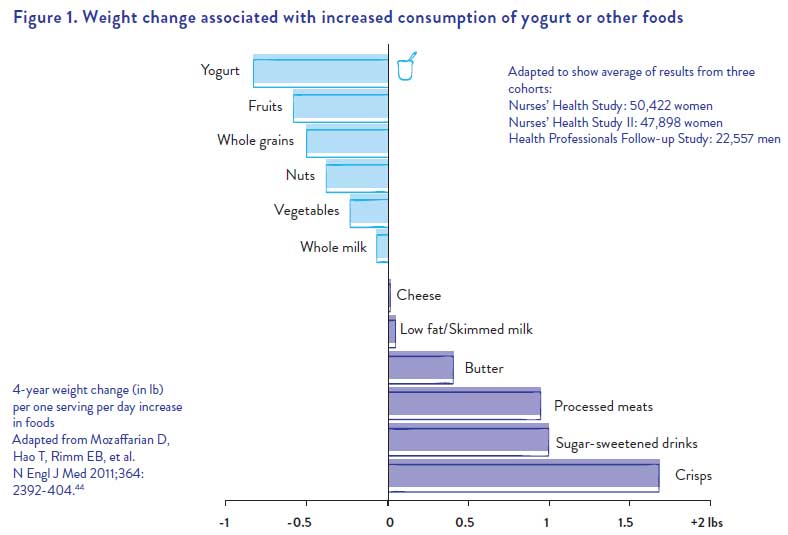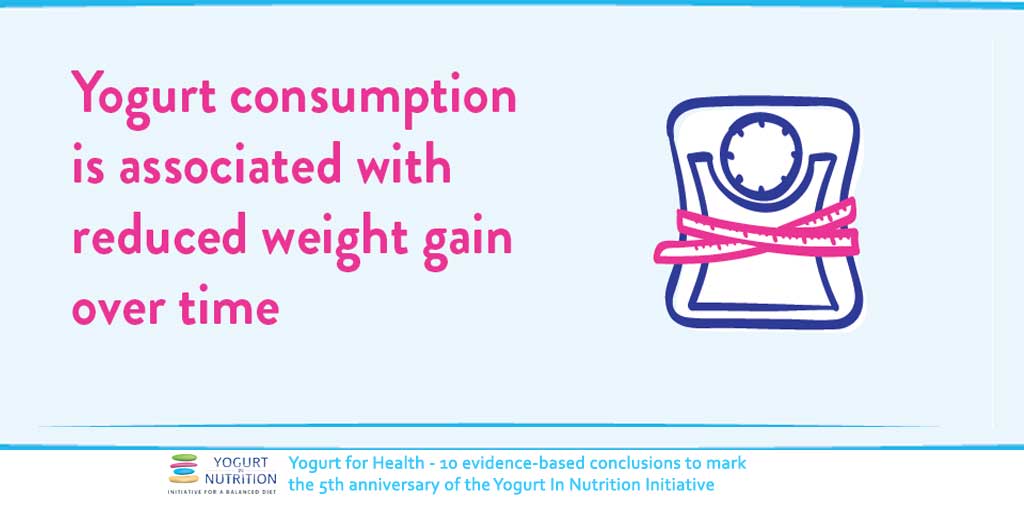“Yogurt consumption is associated with reduced weight gain over time” is one is one of the 10 evidence-based conclusions made by the YINI board about the health effects of yogurt… learn more below.
The effect of yogurt on satiety may partly explain findings by recent reviews that yogurt consumption is associated with lower body mass index (BMI), lower body weight or weight gain, smaller waist circumference and lower body fat.
Studies in adults
Yogurt consumption appears to protect against longterm weight gain, according to pooled results from cohort studies.
This effect is doubled with plain or artificially sweetened yogurt compared with flavoured sweetened yogurt. These results support those of an earlier analysis in which eating more yogurt was associated with less weight gain per 4-year period among 120,877 US healthy non-obese adults followed up for 12–20 years. For each additional serving of yogurt per day there was
372 g less weight gain (Figure 1).
- In the US Framingham Heart Study Offspring Cohort, predominantly overweight people who ate three or more servings of yogurt per week gained about 55% less weight over a year than those who ate less than one serving per week. When it came to waist size, high-yogurt consumers gained 20% less than low-yogurt consumers.
- A large Spanish cohort study in non-overweight adults found that high-yogurt consumption (seven or more servings per week) was associated with a 20% lower risk of overweight or obesity after six years when compared with low-yogurt consumption (two or more servings per week).
- In a Canadian study, yogurt consumption was associated with lower body weight, waist-to-hip ratio and waist circumference, and tended to be associated with a lower BMI when compared with no yogurt consumption.

Studies in Children
Results from the NHANES in US children aged 8–18 years (NHANES 2005–2008) and the Healthy Lifestyle in Europe by Nutrition in Adolescence (HELENA) study showed that yogurt consumption was associated with less body fat.
References:
- Keast DR, Hill Gallant KM, Albertson AM, et al. Associations between yogurt, dairy, calcium, and vitamin D intake and obesity among U.S. children aged 8–18 years: NHANES, 2005–2008. Nutrients 2015;7:1577–93.
- Cormier H, Thifault É, Garneau V, et al. Association between yogurt consumption, dietary patterns, and cardio-metabolic risk factors. Eur J Nutr 2016;55:577–87.
- Eales J, Lenoir-Wijnkoop I, King S, et al. Is consuming yoghurt associated with weight management outcomes? Results from a systematic review. Int J Obes (Lond) 2016;40:731–46.
- Sayón-Orea C, Martínez-González MA, Ruiz-Canela M, et al. Associations between yogurt consumption and weight gain and risk of obesity and metabolic syndrome: a systematic review. Adv Nutr 2017;8:146S–54S.
- Mozaffarian D. Dietary and policy priorities for cardiovascular disease, diabetes, and obesity: a comprehensive review. Circulation 2016;133:187–225
- Mozaffarian D, Hao T, Rimm EB, et al. Changes in diet and lifestyle and long-term weight gain in women and men. N Engl J Med 2011;364:2392–404.
- Wang H, Troy LM, Rogers GT, et al. Longitudinal association between dairy consumption and changes of body weight and waist circumference: the Framingham Heart Study. Int J Obes (Lond) 2014;38:299–305.
- Martinez-Gonzalez MA, Sayon-Orea C, Ruiz-Canela M, et al. Yogurt consumption, weight change and risk of overweight/obesity: the SUN cohort study. Nutr Metab Cardiovasc Dis 2014;24:1189–96.
- Sayón-Orea C, Bes-Rastrollo M, Martí A, et al. Association between yogurt consumption and the risk of metabolic syndrome over 6 years in the SUN study. BMC Public Health 2015;15:170.
- Moreno LA, Bel-Serrat S, Santaliestra-Pasías A, et al. Dairy products, yogurt consumption, and cardiometabolic risk in children and adolescents. Nutr Rev 2015;73(Suppl 1):8–14.



